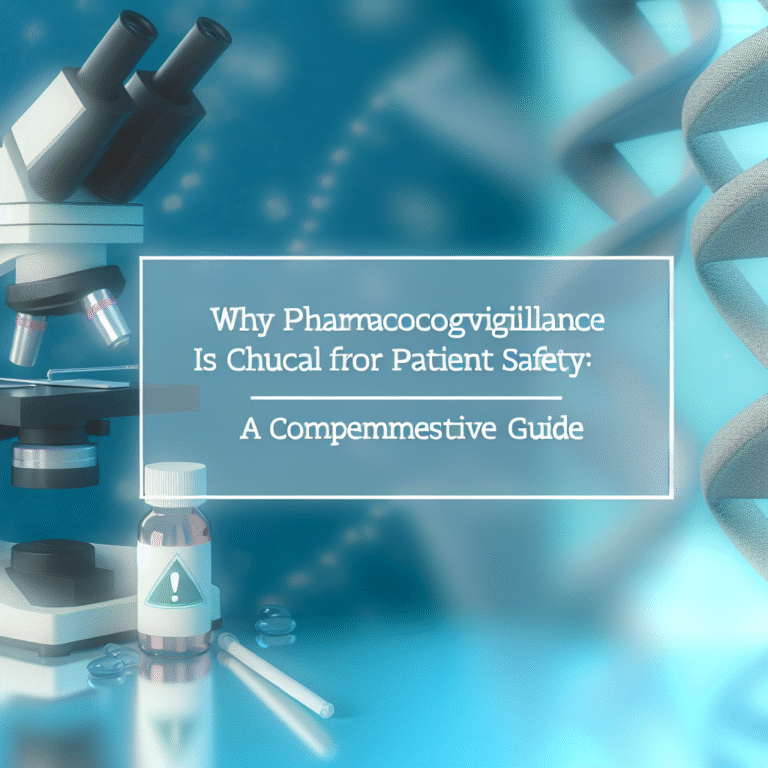The Growing Demand for Pharmacovigilance Specialists: How to Launch Your Career
**The Growing Demand for Pharmacovigilance Specialists: How to Start Your Career**
**Introduction**
Pharmacovigilance may sound like a tricky word, but it’s really important in the world of medicine. If you become a pharmacovigilance specialist, you’ll help keep track of medicines to make sure they’re safe for people. This kind of work is becoming more and more needed because it protects patients and helps keep rules in place so healthcare systems can be trusted.
**What is Pharmacovigilance?**
Pharmacovigilance is about watching how safe medicines are. If you’re a specialist in this area, you help by:
1. Keeping an eye on how well drugs work and reporting any problems.
2. Evaluating risks and suggesting ways to make drugs safer.
3. Working with doctors, nurses, and rule-keeping agencies.
Pharmacovigilance helps make sure that medicines are safe, which means doctors can make better choices and take good care of patients.
**The Growing Demand in the Industry**
Why do pharmacists need more people like you? Here are some reasons:
1. More drugs are being made, which means more work checking if they’re safe.
2. There are strict rules about drugs, so companies need people who understand them.
3. As drug companies expand globally, there’s a need to follow international rules and keep drugs safe everywhere.
Because of these reasons, more jobs are opening up in this field, and it’s expected to keep growing.
**Skills and Qualifications Needed**
To make sure you’re a great fit for this job, here’s what you need to learn:
1. **Education**: It’s best to start with degrees in pharmacy, life sciences, or similar areas.
2. **Skills**:
– Be good at analyzing data and paying close attention to details.
– Communicate well with others to report findings clearly and work together.
– Know how to use pharmacovigilance tools and technology.
3. **Certifications**: These prove your expertise.
– Take the Drug Safety Certification.
– Join groups like the Drug Information Association (DIA) or the International Society of Pharmacovigilance (ISOP).
**Steps to Starting Your Career in Pharmacovigilance**
1. **Educational Paths**:
– Consider doing studies in pharmacology, life sciences, or similar fields.
– Look into advanced studies or special courses related to pharmacovigilance.
2. **Gaining Experience**:
– Try starting with entry-level jobs like pharmacovigilance associate.
– Internships at drug companies are very valuable.
– Attend networking events and industry meetings to meet others in the field.
3. **Continue Learning**:
– Take online courses and workshops to learn more.
– Get more certificates to stay ahead.
– Keep up with what’s new in the industry.
**Potential Career Paths**
Starting in pharmacovigilance can lead to different job options:
– Begin as a pharmacovigilance associate or drug safety officer.
– Move up to roles like pharmacovigilance scientist or drug safety manager.
– Aim for roles like director of pharmacovigilance or regulatory specialist.
These steps let you explore all the different parts of pharmacovigilance.
**Challenges and Things to Consider**
This job has its challenges:
1. Understanding the ethical and legal sides of drug safety.
2. Dealing with tough situations that affect public health.
3. Always learning about new rules and technologies.
**Resources and Groups for Aspiring Specialists**
Want to know more? Check out these resources and groups:
1. Read books and articles about pharmacovigilance.
2. Join groups like ISOP or DIA for networking opportunities.
3. Explore online communities where you can discuss pharmacovigilance.
**Conclusion**
Pharmacovigilance specialists are key to making sure medicines are safe. As the world of medicine changes, it’s a great time to start your career in this essential field. Get the right knowledge and skills, and start making a real difference today.
**Call to Action**
Are you excited to join the field of pharmacovigilance? Sign up for webinars and online courses to learn more. Keep up with the latest news and trends. Don’t be shy—reach out and connect with experienced people on LinkedIn or at industry events. Your future career in this important field is waiting for you!





